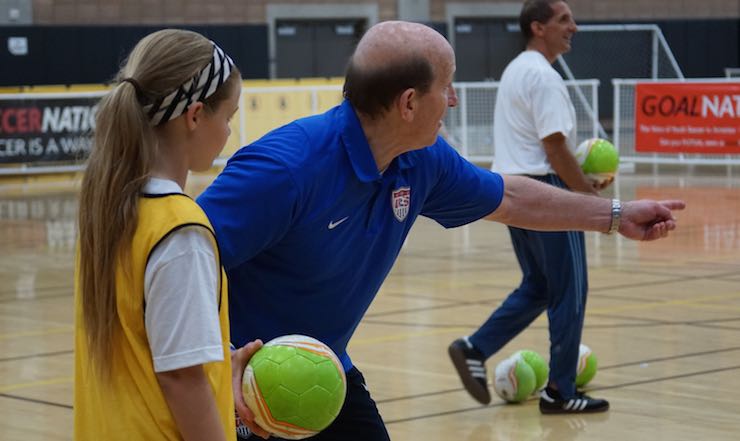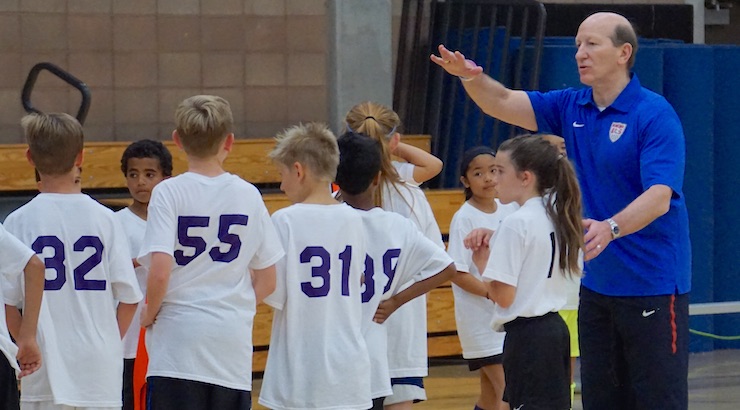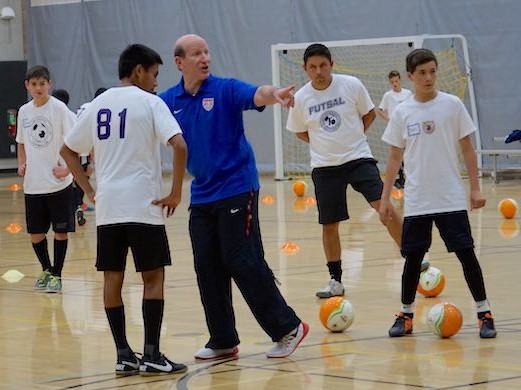Sean Bowers’ Recap On 2015 Southwest Futsal ID Camp
SoccerToday spoke with Sean Bowers, former Captain of the US FUTSAL National Team and the founder of 619 Futsal in San Diego, to get his feedback on the recent Southwest Futsal ID Camp and how FUTSAL improved his game.

The US Youth Futsal Regional Camps are a Path to National Futsal I.D. Camp – Recap on the recent ID Camp for the Southwestern Region held at 619 FUTSAL in San Diego in April 2015.
This is America’s first-ever futsal player identification program, designed to identify and develop elite players in the most challenging and competitive environment possible. Launched last year, the US Youth Futsal National ID program includes eight regional Futsal I.D. camps. Led by Keith Tozer and his U.S. Youth Futsal Coaching Staff, players are ranked at these regional camps and the top performers are invited to compete at the annual National ID Camp where the most elite players are selected to form teams which will represent our country at the international Futsal competition in Costa Rica.
“The top players at each Regional I.D. Camp are selected for the regional teams,” said Director of Futsal I.D. Soorena Farboodmanesh. “The regional teams will attend the National I.D. Camp, at which youth national teams are named.”
SoccerToday interviewed Sean Bowers, who worked with Keith Tozer at the Southwest Regional Camp, and discovered how popular Futsal is in Southern California.
Diane Scavuzzo: Was the recent US Youth Futsal Southwest Regional ID Camp successful?
Sean Bowers: The numbers were tremendous. The ID Camp was very successful. We had over 140 kids registered and more importantly, the players develop tremendously through the camp’s training. Keith Tozer was amazing working with the players. Even the majority of the youth soccer players in our 619 Futsal league don’t understand the tactical side of futsal. By just running a couple of sessions, it was great to have the players and parents understand the concept of futsal.
 Diane Scavuzzo: The Southwest Region is 1 of 7 different regions of US Youth Futsal. How will the players from the Southwest Region who were selected from this ID Camp fair when they meet kids from the rest of the country?
Diane Scavuzzo: The Southwest Region is 1 of 7 different regions of US Youth Futsal. How will the players from the Southwest Region who were selected from this ID Camp fair when they meet kids from the rest of the country?
Sean Bowers: I think soccer skill wise our players from the Southwest are top notch.
Our tactical ability is where we would need to improve. Youth soccer players from other regions train futsal after school, they don’t train soccer. Futsal is year round for them, not just a game they play on Sundays. City Futsal in Dallas, for example, buses their kids in after school and they train 5 days a week. Our players play in a league they, don’t train year round.
Diane Scavuzzo: What advice would you give the players on how to prepare for success at the National ID Camp?
Sean Bowers: I would recommend that they watch film on futsal and how the national teams play. Players wanting to improve their game should watch the tactics on how the professionals do a 3-1 or 4-0. Also, I would suggest that the players work on their skills with the ball.
We are going to have four trainings for these selected kids before they head to the National ID Camp.
Diane Scavuzzo: What is it like at the National ID Camp?
Sean Bowers: There are trainings and players will be evaluated right away in those trainings. And the coaches will evaluate the players as a 1, 2 or 3, 1’s being the better players, 2’s being in the middle and 3’s are kids needing to improve their skills more before they can represent the USA in an international Futsal competition. The players will then be split up in their specific groups and play with the players of the same level, so it’s not about what region you came from.
 Diane Scavuzzo: How does futsal translate to the outdoor game?
Diane Scavuzzo: How does futsal translate to the outdoor game?
Sean Bowers: Most importantly, Futsal players learn how to play the game of soccer in a very small space, which allows them to have more time on the ball compared to the outdoor game, and therefore their first touch is much quicker. Players who train at Futsal also understand the 1v1 scenarios much better.
Futsal enhances all your skills. Defensively, Futsal training helps players learn how to mark a man, what side you’re supposed to be on, how to take advantage when the offensive player takes a bad touch, where to step — and so many other aspects of the game.
Offensively, Futsal helps players learn how to create space.
Futsal also allows players to try the things they learn because there is no end result (winning is not the focus of the games at 619 Futsal). Players can be comfortable to try their moves, unlike during an outdoor match. If you’re in the middle of State Cup, trying a new move can be difficult – What happens if the other team scores? The coach will be upset and you will never try that move again. Futsal creates an environment for players to fail so that they can be successful.
I’m a big believer that you have to fail to be successful.
Diane Scavuzzo: When did you start playing futsal?
Sean Bowers: In 1996, when I was first called to the National Team. I had never seen or played the game of Futsal before.
Diane Scavuzzo: What was your reaction? Before and after you received the call?
Sean Bowers: I asked the National Team coach why he called me in. I’m a 6’2”, 195 lb defender who likes to kick and scratch and intimidate people and Futsal is the complete opposite, it’s technical and tactical.
I fell in love with the game because it made me a better player. And, to be quite honest, I kept going because I failed a lot at it.
Diane Scavuzzo: Do you remember your first success at Futsal?
Sean Bowers: When we went to the World Cup in 1996 in Brazil, even though we didn’t do very well. We were up against teams with veteran Futsal players and our team was majority first-time indoor players.
We lost to Brazil 15 to 1 in 1996 but in 2004, we lost 8 to 5, so the steps we were making were huge at that time.
Diane Scavuzzo: Keith Tozer refers to you as the most capped player. What is your response to that?
Sean Bowers: I think it shows to my consistency as a player. I definitely wasn’t the best player on the team but I never went out at night, I always did the right thing and tried to keep others doing the right things as well. Sometimes that put me in a bad spot, but I was never afraid to cross that line and put the team first. Whether it was in Costa Rica, Brazil, Belgium or Taiwan. Team first.
Diane Scavuzzo: What do you think it takes to make a good leader?
Sean Bowers: You have to take a risk. The problem is a lot of Captains don’t want to go over that line because they are friends with everyone on the team. The team comes first. The other part of being a captain is you always have to worry about everyone else and you don’t worry about yourself. There’s a lot of sacrifices that you give up but ultimately you do well as a team.
RELATED ARTICLE: 2015 Southwest Region Futsal I.D. Camp






